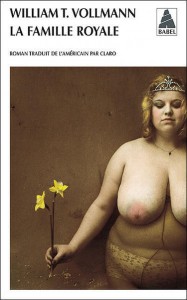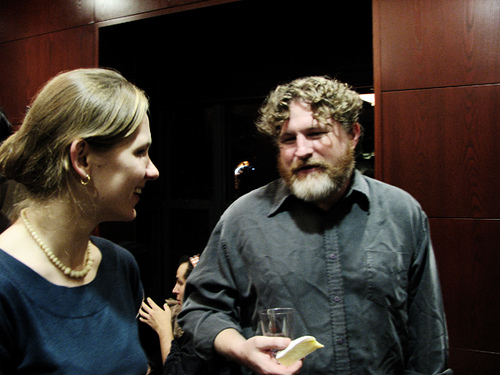At Vice, a text/image collaboration between Brian Evenson and John Sellekaers, excerpted from a book length work.
Just heard from Victoria at Underland: Brian Evenson’s Last Days won the American Library Association Horror Novel of the Year Award.
20 Important Books in Other Languages; or, “a list always growing longer”

A post re:– neither repost nor riposte–Blake’s wichtige Liste and (only at first) about Infinite Jest in German. Maybe a chair is a good metaphor for who gets translated. Have you been translated? Have the Important Writers on Blake’s list? And not 25 because Saramago, Ouredník, and Zizek are already others, Ben Lerner’s a poet, Aase Berg’s both, and I’ll write about poets in translation and translation in poets at an other time.
Not sure if anyone went there during all the well DFW grammar talk (thanks, Amy), but imagine translating, say, Oblivion. Good that one of Wallace’s German translators, Ulrich Blumenbach, did just that, presumably (it first appeared in 2006), while whittling away at Infinite Jest, which took him six years and has had, as Unendlicher Spass (literally, the less Shakespearean Unending Fun), endless success: ten times the expected five grand copies have been sold since it appeared at the end of August, on the heels of Infinite Summer, which the publisher, KiWi, has translated too, as 100 Days of Infinite Jest (in German–it ended on 12-1).
In an interview with Der Spiegel, Blumenbach (pictured–in German) regrets that the author never answered his many questions, “a list always growing longer”: it seems Wallace had grown weary of taking translator’s queries, and, according to The Complete Review’s useful paraphrase of a slippery summary (still looking for the original source), considered the Spanish La broma infinita (tr. Calvo and Covian | Mondadori, 2002) and the Italian Infinite Jest (Nesi w/ Villoresi and Giua | Einaudi, 2006) and apparently other attempts (anyone know more?) to have “all failed, more or less.”
 In a warm war, France is responding with (900 pp. of) Vollmann’s Rising (not translated by the great Claro, see below, who did six previous tomes, but by one Jean-Paul Mourlon, translator, it seems, of Jimmy Carter and Hilary Clinton). There’s also German Vollmann (3 titles), Spanish Vollmann (3 more), Japanese Vollmann (2), Greek Vollmann (2), and Czech Vollmann, all (not counting the French) with only one title (Butterfly Stories) repeated.
In a warm war, France is responding with (900 pp. of) Vollmann’s Rising (not translated by the great Claro, see below, who did six previous tomes, but by one Jean-Paul Mourlon, translator, it seems, of Jimmy Carter and Hilary Clinton). There’s also German Vollmann (3 titles), Spanish Vollmann (3 more), Japanese Vollmann (2), Greek Vollmann (2), and Czech Vollmann, all (not counting the French) with only one title (Butterfly Stories) repeated.
American Genius is only a Great American Novel for now (does it even have a British publisher?), despite Tillman’s first book of stories, Tagebuch einer Masochisten, having appeared in Germany in 1986, four years before her first collection in English, READ MORE >
Two things for you to do if you live where I live and like things like things I like, which maybe if you are like me you will, or if you aren’t like me but you like me, or if you don’t like me and want to know where you can find me because you want to find me there so you can hit me when you find me, which, please, do not do because I don’t deserve that kind of treatment because I didn’t do anything to deserve it, unless I did, and don’t remember or didn’t realize, which is totally possible, but still please don’t hit me
First a reminder that The New York Tyrant event for #7 and for BABY LEG BY BRIAN EVENSON kicks off in just a few hours. Details at Blake’s post from the other day.
Also, I am reading on Monday 11/23 at PS122, with the Wu Ming Collective, that group of Italians who write novels together. I will (probably) be reading from my novel-in-progress. If I don’t chicken out or otherwise lose my shit, this will be the first public reading of material from the ostensible “book.” I don’t know what Wu Ming will be doing. Details at the event’s Facebook page.
New Brian Evenson story “Windeye” (which he read this year at &Now) is available in the new Pen America, both in print and online. It’s a killer, as usual.
Another killer interview from Michael Kimball, this time with Brian Evenson, at the Faster Times.
Gigantic has posted a Halloween web special which, among other things, includes a conversation with Brian Evenson regarding horror films and his work.
Story by Story: Brian Evenson’s Fugue State (17) ‘Fugue State’

The 17th and titular story of Fugue State is also its lengthiest, and of all those before it, perhaps the tract with the widest aim. Whereas up until now the majority of the texts herein have reckoned with themselves via a manner of constant recursion, spiraling into their own centers, ‘Fugue State’ the story is bookended by situations that find the ever-disassociative protagonist at the cusp of exiting his interior–and yet, in each instance, the bookends ultimately also end up serving as mirrors, reflecting, again, the lack of light onto itself.
As the title suggests, and again as has been the primary defining factors of all of the voices herein, our protagonist suffers from the inability to keep his reality in crystal grips. Any time the sentences find him beginning to ascertain something about himself to be true, or presented as true to the reader, further sentences serve to skew that understanding via small strokes, often questions the protagonist asks himself–”Had he done anything wrong?” “But couldn’t he explain that away?” “’Is anybody there?’” “’Do you remember your name?’” The deeper on we tread into the story, also, the quicker the questions begin to come, as further skewing, and skewing of the skewing, leaves even the questions to be questioned. What is being asked?
October 21st, 2009 / 11:09 am
For all you Chicago HTMLreaders, Brian Evenson will be reading tonight (with Tod Goldberg and David Taylor) at the Bookslut Reading Series, at 7:30 at the Hopleaf. Evenson! Beer! Beer! Evenson!
Story by Story: Brian Evenson’s Fugue State (14) ‘Helpful’

Fourteenth in the order of stories in Brian Evenson’s Fugue State (out now from Coffee House Press) is ‘Helpful,’ which originally appeared in Bombay Gin.
At this point in the collection, we have looped through loops of cold expanse and careful molding, each rendered in Evenson’s clean, calm and deadly sentences, most as blank as any stroke of light in a Kenneth Anger film, any globe of far off light.
Here, having crossed over the threshold of those gone rooms, and entered the center of the void via Evenson’s masterful arrangement of the stories so far, the frame of the lenses, like in Anger’s opus Invocation of My Demon Brother, begins to split.

July 30th, 2009 / 12:41 pm
